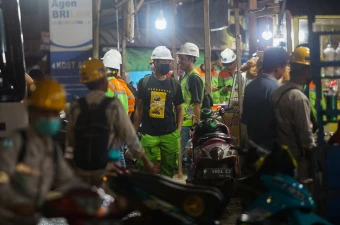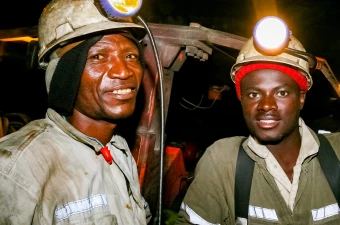As elections approach, Venezuela finds itself in a state of deep crisis. Unemployment is extremely high and even the most basic treatment is missing from the healthcare system. People can hardly afford to buy anything at all with their current incomes due to hyperinflation. The country is facing a famine and more than 4.6 million Venezuelans are being forced to flee to neighbouring countries, like Colombia, Peru and Curacao. Work and income issues, as well as the lack of social dialogue in Venezuela came up again on November 6 in Geneva at a special commission of inquiry of the UN labor organization ILO.
Modern-day slavery
José Vincente Rivero, the leader of ASI, an independent union that is also one of CNV Internationaal’s partner unions, says that incomes are virtually nothing. “Workers are earning a monthly income of approximately $1.72 for 162 hours worked. Here in Venezuela we no longer get paid to work. We pay to work. This is modern-day slavery.”
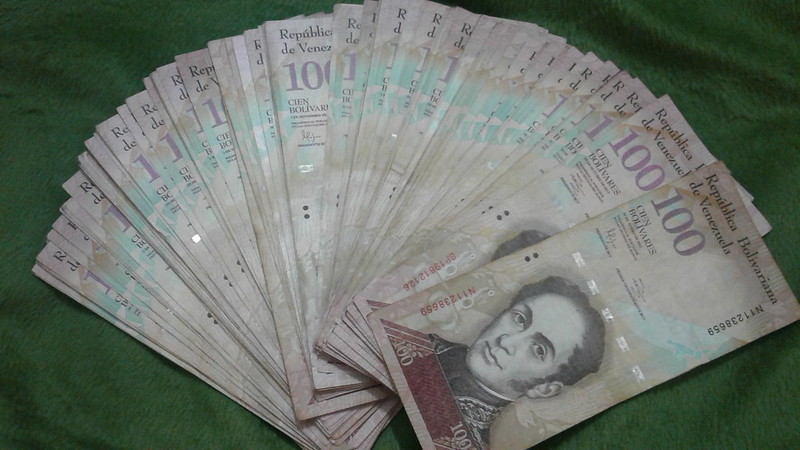
14 zeros deleted
The union leader is also worried about the removal of social benefits. José Vicente explains the consequences of the country’s economic policy, telling us, “In 2021, Venezuela removed 14 zeros from its currency. As a result, a worker who earned 3 million bolivar and had built up 9 million bolivar in social benefit payments, now has nothing in their bank account. They have nothing left for all they had built up over the years.
Government imposed wages and prices
The government in Venezuela imposes the wages and prices. Employers organizations and independent trade unions submitted a complaint 2 years ago about how the minimum wage was being determined because for years there had no longer been any type of discussion or agreement among the social partners. That is a serious violation of the freedom to organise.
ILO resolution gives new hope
Leaders of the independent trade union ASI, José Vincente and Leida Marcela are in Europe to raise awareness of extreme problems. The developments in Venezuela came up again on November 6 in Geneva at a special commission of inquiry of the UN labor organization ILO.
Trade union ASI submitted a resolution in Geneva that was adopted by all parties, governments, employers and employees. ASI leader Marcela Leida reacts with hope: "This will allow the continuation of the path of social dialogue in Venezuela, in the presence and with the assistance of the international community from the ILO." Leida calls on her compatriots not to lose hope. "Social dialogue is the means to work for fair work, fair pay and social justice.
Working towards recovery and solutions
"This is a huge opportunity," adds fellow union leader José Vicente. "The Venezuelan accepts the presence of the ILO in the country. Now we can start working with the Ministry of Labor on recovery and solutions to the problems with wages and social security."
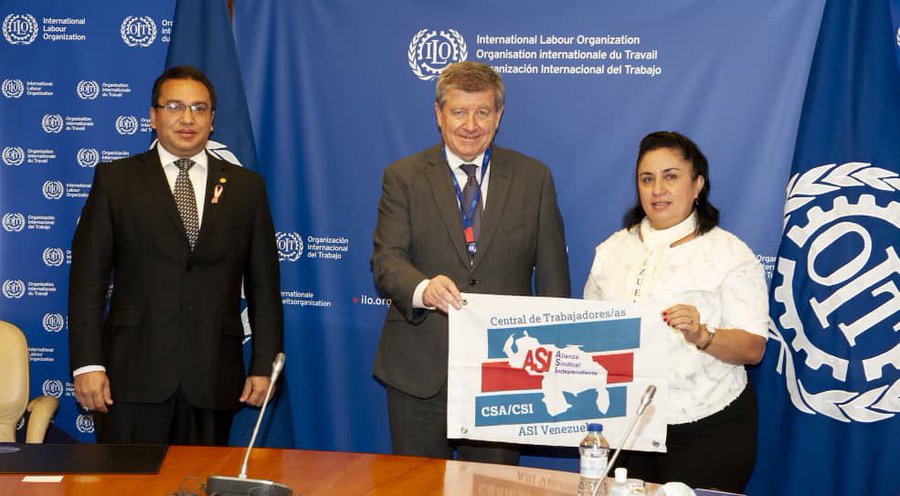
The situation in Venezuela has beene reviewed again in Geneva on November 6th by the UN’s labour organisation, the ILO. From left to right : José Vincente (ASI-Venezuela), Guy Ryder, General Director ILO and Leida Marcela, ASI)
A complaint was submitted to the ILO in 2015 by both employers and employee organisations in Venezuela. The complaint was in regard to violations of freedom of association, interference in the union election process, as well as the right to collective bargaining. The unions requested protection of these fundamental labour rights and ILO guidance in opening a tripartite social dialogue.
In response, the ILO decided to establish the investigative committee. This is a remarkable step, one which the ILO has only taken 13 times in their 100 year history.
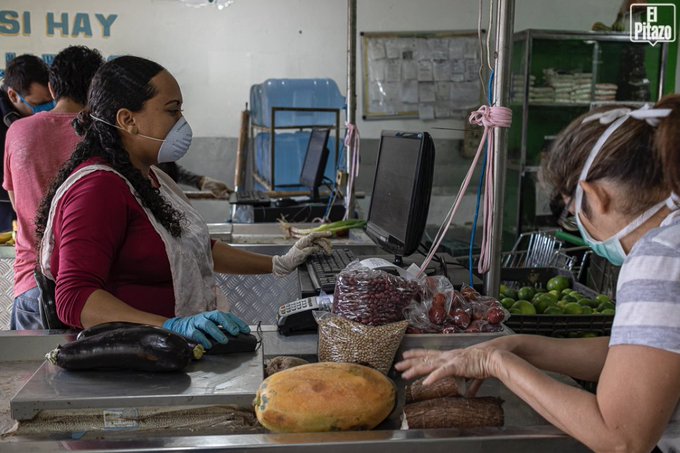
In Venezuela people can hardly afford to buy anything at all with their current incomes due to hyperinflation.
ASI proposals
On November 6th, Leida Marcela Leon and Jose Vincente Rivero, leaders of the independent union ASI, submitted proposals to the ILO on how to better protect the workers.
Emergency income
ASI proposes the implementation of a year-long emergency income in order to reactivate the economy. This is also recommended by CEPAL, a regional economic think tank set up by the UN. In addition, they want assistance in fighting the COVID 19 pandemic. Agreements are urgently needed in regard to delivering vaccinations with the COVAX mechanism.
ASI wants the ILO to set up an office in Venezuela which will execute a programme for fair work. They are also submitting a plan for an emergency law which will establish a national tripartite socio-economic council.
International cooperation and support of these endeavors is crucial. After the meeting in Geneva, the Venezuelan union representatives are visiting other unions and political organisations in Europe. CNV Internationaal and French union CFDT are supporting them during these visits.
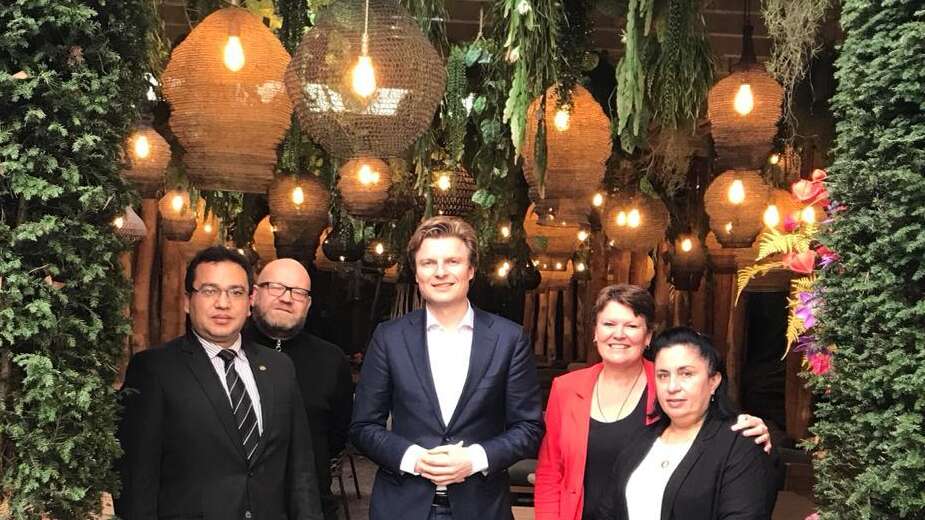
ASI-leaders Leida Marcela Leon and Jose Vincente Rivero meeting with Ruben Brekelmans, Member of Parliament and foreign affairs spokesman VVD
The ASI representatives are looking for support from Europe. “We need international support to strengthen the dialogue, to let the workers’ voices be heard, and to ensure an inclusive board where all the different parties work together towards growth. This growth must include the improvement of workers’ rights and gaining recognition for trade unions.”
CNV Internationaal President Anneke Westerlaken supports ASI in their efforts to establish inclusive dialogue. She reiterates, “Social dialogue is the only peaceful way to repair the loss of workers’ rights in Venezuela.”
COVID 19 and healthcare in Venezuela
More than half the hospitals in the capital city of Caracas have no water. Gloves and masks are being re-used. Only 1 in 15 hospitals in Caracas has disinfectant. Healthcare workers have no means of protection and salaries are not being paid (or only partially). And there are no COVID vaccines for these healthcare workers.
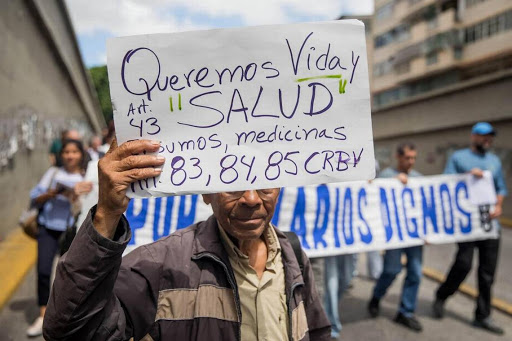
More than half the hospitals in the capital city of Caracas have no water. Gloves and masks are being re-used. Only 1 in 15 hospitals in Caracas has disinfectant.
Nurse and active union member, Ada Macuare, protested this irresponsible situation and was arrested during her shift in the emergency department. After international protests, she is free for now, but is still facing a court case. Ada Macuare isn’t the only trade union leader who’s been arrested.
The independent trade unions are being hindered by the government and their leaders are being harassed. There are many cases of these leaders being threatened, arrested, and even tortured.
[updated 12 Nov.]
Publication date 05 11 2021
